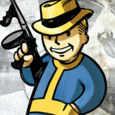-
Content count
6 -
Joined
-
Last visited
Posts posted by ralfy
-
-
QuoteThe Road is a 2006 novel by American writer Cormac McCarthy. It is a post-apocalyptic novel detailing the journey of a father and his young son over a period of several months, across a landscape blasted by an unspecified cataclysm that has destroyed most of civilization and, in the intervening years, almost all life on Earth. The novel was awarded the 2007 Pulitzer Prize for Fiction and the James Tait Black Memorial Prize for Fiction in 2006. The book was adapted to a film of the same name in 2009, directed by John Hillcoat.
-
In case the ff. haven't been mentioned:
QuoteThe Prisoner is a 1967 British science fiction-allegorical television series about an unidentified British intelligence agent who is abducted and imprisoned in a mysterious coastal village, where his captors try to find out why he abruptly resigned from his job.[2] It was created by Patrick McGoohan and George Markstein with McGoohan playing the main role of Number Six.[3] Episodes covered various plots from spy fiction with elements of science fiction, allegory and psychological drama.[4] It was produced by Everyman Films for distribution by Lew Grade's ITC Entertainment company.[4]
QuoteThe Sandbaggers is a British television drama series about men and women on the front lines of the Cold War. Set contemporaneously with its original broadcast on ITV in 1978 and 1980, The Sandbaggers examines the effect of espionage on the personal and professional lives of British and American intelligence specialists. The series was produced by Yorkshire Television, based in Leeds.
QuoteDoomwatch is a British science fiction television programme produced by the BBC, which ran on BBC1 between 1970 and 1972.[1] The series was set in the then present day, and dealt with a scientific government agency led by Doctor Spencer Quist (played by John Paul), responsible for investigating and combating various ecological and technological dangers.
-
QuoteThe Sea of Fertility (豊饒の海 Hōjō no Umi) is a tetralogy of novels written by the Japanese author Yukio Mishima. The four novels are Spring Snow (1969),[1] Runaway Horses (1969), The Temple of Dawn (1970), and The Decay of the Angel (1971).[2] The series, which Mishima began writing in 1964 and which was his final work, is usually thought of as his masterpiece. Its title refers to the Mare Fecunditatis, a lunar mare.
-
QuoteOne Hundred Years of Solitude (Spanish: Cien años de soledad, American Spanish: [sjen ˈaɲoz ðe soleˈðað]) is a landmark 1967 novel by Colombian author Gabriel García Márquez that tells the multi-generational story of the Buendía family, whose patriarch, José Arcadio Buendía, founded the town of Macondo, a fictitious town in the country of Colombia.
The magical realist style and thematic substance of One Hundred Years of Solitude established it as an important representative novel of the literary Latin American Boom of the 1960s and 1970s,[1] which was stylistically influenced by Modernism (European and North American) and the Cuban Vanguardia (Avant-Garde) literary movement.
Since it was first published in May 1967 in Buenos Aires by Editorial Sudamericana, One Hundred Years of Solitude has been translated into 37 languages and has sold more than 30 million copies.[2][3][4] The novel, considered García Márquez's magnum opus, remains widely acclaimed and is recognized as one of the most significant works in the Spanish literary canon.[5] -
QuoteThe Name of the Rose (Italian: Il nome della rosa [il ˈnoːme della ˈrɔːza]) is the 1980 debut novel by Italian author Umberto Eco. It is a historical murder mystery set in an Italian monastery in the year 1327; an intellectual mystery combining semiotics in fiction, biblical analysis, medieval studies and literary theory. It was translated into English by William Weaver in 1983.
The novel has sold over 50 million copies worldwide, becoming one of the best-selling books ever published.[1] It has received many international awards and accolades, such as the Strega Prize in 1981 and Prix Medicis Étrangère in 1982, and was ranked 14th on Le Monde's 100 Books of the Century list.


Looking for War Game Similar to Crusade in Europe
in Strategy Game Discussion
Posted
I'm looking for a war game that's similar to Crusade in Europe:
I think it has the following qualities:
1. strategic rather than tactical level, involving divisions, regiments, etc.;
2. historical (actual names of military units with number of personnel, tanks, etc.);
3. runs in real-time (the player pauses the timer to give orders) with fog of war;
4. not a lot of micro-management: the orders are attack, defend, transport, etc., with supplies sent daily from depots; and
5. air units attack and then return to base.
The game offers what-if scenarios (like strengthened and air-dropped units in the Battle of the Bulge), and there are other games in the series (like Conflict in Vietnam, which has a what-if scenario for Dien Bien Phu, and Decision in the Desert, on the WW2 North African campaign).
There are links to the games and manuals, but I haven't tried them:
https://archive.org/details/msdos_Crusade_in_Europe_1985
https://archive.org/details/CrusadeInEurope
https://archive.org/details/msdos_Decision_in_the_Desert_1985
https://archive.org/details/agm_Decisions_in_the_Desert
https://archive.org/details/msdos_Conflict_in_Vietnam_1986
https://archive.org/details/ConflictInVietnam